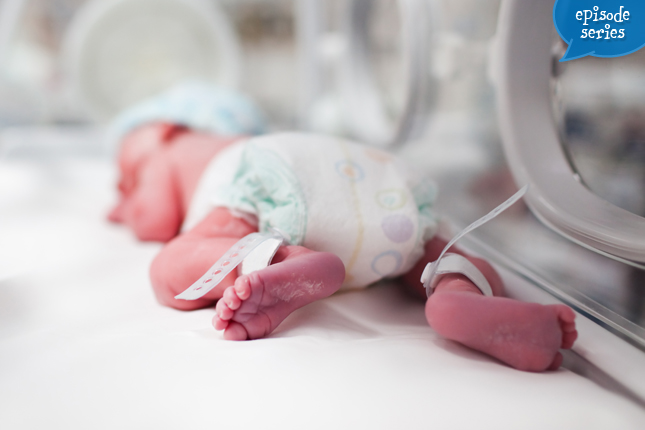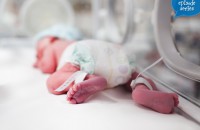The Twin Talks
Inside the NICU: Bonding With Your Babies
[00:00:00]
Please be advised, this transcription was performed from a company independent of New Mommy Media, LLC. As such, translation was required which may alter the accuracy of the transcription.
[Theme Music]
ELEATA DONALSON: Preterm birth is more likely for twins compare to singleton birth. This may result in a time spend in the NICU. For many time parents, this can be a tough period when they may not feel: “They can easily connect with their newborn twins who are under constant medical care.
I am Eleata Donalson. I’m an NICU nurse at Tri City Medical Centre in Vista, California. This is Twin Talks Episode Number 25.
[Theme Music/ Intro]
CHRISTINE STEWART-FITZGERALD: Well, welcome to Twin Talks broadcasting from the Birth Education Centre of San Diego. Twin Talks is your weekly online on-the-go support group for expecting and new parents to twins. I’m your host Christine Stewart-Fitzgerald.
Now, have you heard about The Twin Talks Club? Our members get bonus content after each new show plus special giveaways and discounts. Subscribe to our monthly Twin Talks Newsletter and learn about the latest episodes available.
Another way you can stay connected is by downloading our free Twin Talks App. It’s available in the Android and iTunes Marketplace. So before we get started, I’m going to turn this over to our producer Shelly.
SHELLY STEELY: I’m Shelly Steely. I’m the producer here at Twin Talks. I’m also the mother of identical twin boys who are going to be two on July. I wanted to tell you about our Virtual Panellists Program.
So, for those of you who wanted to participate in the conversation from home, you can follow us on Facebook and Twitter. But to join in, you can use the hash tag #TwinTalksVP to be a part of the conversation from your house.
CHRISTINE STEWART-FITZGERALD: All right. Let’s go around the room and do a little introduction, Karolina?
KAROLINA RANGEL: I’m Karolina Rangel, 39 years old. I’m a stay-at-home mom and I have two identical girls that are almost two.
CHRISTINE STEWART-FITZGERALD: Two to two.
BRENDA RUHL: I’m Brenda. I’m 49 years old. I’m an accountant and I have three boys. My oldest is 13 and my identical twins are 11.
MISHELL RUDDEN: I’m Mishell. I’m 34 years old and I’m a part time teacher and full time mom to my two year old boy-girl twins: Sunny and Matthew.
CHRISTINE STEWART-FITZGERALD: I’m your host Christine Stewart-Fitzgerald. I’ve got identical twin girls who are 4 ½ and they are a handful. I’ve got a singleton girl who is 18 months. So, we’ve got all girls and of course my husband it’s payback for him. He’s one of three boys. So, he’s always threatening to get a dog with big Kahunas.
[Theme Music]
SHELLY STEELY: So, in keeping with our twins on the news segment. We have something that’s close to us local here in San Diego. The Padres own second-basemen Jedd Gyorko. His wife just gave birth to twins. He took his two games stand on the paternity list and now, he’s back on the field.
He says: “He’s excited. He has a lot of mixed emotions. He’s ready to get back to baseball.” What’s interesting about this though is that: “His twins are spending a little bit of time in the NICU.” I believe one of his boys have some in there.
They are taking advantage of new technology which has a webcam actually in the NICU; so that he can keep an eye on his baby when he’s not around which I think would just be great for any parent who travel.
I know we don’t have that many major league baseball parents around; but in a military town with deployments or overseas, family far away – it seems like really great technology.
CHRISTINE STEWART-FITZGERALD: That’s great. So basically, own I understand. He can use his iPad or any kind of phone and get connected to actually see his one of his twins that are in the NICU.
MISHELL RUDDEN: That’s amazing.
BRENDA RUHL: I love that.
CHRISTINE STEWART-FITZGERALD: Now, I like the idea of staying connected. I think you can open it up to whomever you want, you can send a link to extended grandparents, cousins and friends. They can see them as well.
SHELLY STEELY: Does this sound like something you guys would have use?
KAROLINA RANGEL: We use Skpe for my grandma in Germany and family. But, we would have definitely used a webcam. That would have been amazing to be able to have shared that.
BRENDA RUHL: Did the NICU not have any issue with you Skyping while you’re in the NICU?
MISHELL RUDDEN: No,
KAROLINA RANGEL: Good.
KAROLINA RANGEL: We were able to Skype and everybody said: “Hello from across the seas.” Yes, it was amazing.
BRENDA RUHL: I love that. I wish that we had the availability back then. They have it for my pre-school for my kids. So, I would use the webcam and I would see my son from work and it would make me a little less sad about getting to work. But, it hadn’t been available for the NICU not just for [inaudible] but even times when I couldn’t get there.
Again, I have my toddler at home and all that. I wasn’t there all day every day. So those times when I wasn’t there, it would be nice to be in the middle of the night I’m worried. Go look at: “They’re peaceful asleep.” That would have been a wonderful tool.
SHELLY STEELY: Let’s hope that most dads get more than three days of paternity leave. But, the reality is: “It’s hard for both parents to take time off work especially if you’ve had bed rest or you have a parent who is deployed or working full time or out of there.” So, it seems like a really great option and congratulations to him and his wife.
BRENDA RUHL: Yes, congratulations.
MISHELL RUDDEN: Congratulations.
[Theme Music]
CHRISTINE STEWART-FITZGERALD: All right, well today’s topic is: “Inside the NICU, bonding with your babies.” Today, we’re talking with Eleata Donalson who’s here to talk about: “Different ways that parents can bond with their newborn twins while they’re in the NICU.” So, thanks for joining us today Eleata.
ELEATA DONALSON: Thank you for having me.
CHRISTINE STEWART-FITZGERALD: Yes, we knew that there is a higher incidence of preterm birth among twins. So, preterm is really defined as: “I think any time before 38 weeks for twins?”
ELEATA DONALSON: Yes.
CHRISTINE STEWART-FITZGERALD: So, as a result they often end up in the NICU and it could be maybe for hours. It could be for days or weeks. Maybe you can enlighten us. Is there any kind of common time length of stay?
ELEATA DONALSON: It just depends. We usually try to tell parents: “Look towards the day that they were due.” So, you’re looking at: “At least four to six weeks.” Sometimes it can be a little bit longer or they can go home a little bit sooner. It’s just depending on how that baby progresses.
If you’re eating well, you’re gaining weight. You’re in an open crib and you’re doing all over that, we’ll send you home sooner. Be with your breastfeeding or bottle-feeding – but as long as you could those three things; those are what they look for.
CHRISTINE STEWART-FITZGERALD: So, later term babies may have just a little bit of time in the NICU and maybe not at all. I think I know our hosts and the owner of New Mommy Media – Sunny has her babies were born at 35 weeks and didn’t spend any time in the NICU.
ELEATA DONALSON: Very good for her.
CHRISTINE STEWART-FITZGERALD: That was awesome.
ELEATA DONALSON: That was great.
CHRISTINE STEWART-FITZGERALD: One of my girls she just had some breathing issues when she was born. They were full term. In fact, they were 39 weeks, 5 days – so the 40th week. So, she was only in for a few hours. They just wanted to make sure that she was breathing well on her own. So, but I could be really at any age.
MISHELL RUDDEN: Right. They don’t look at your weight anymore either, right?
ELEATA DONALSON: No. When I first started in nursing, we used to say: “Well, you needed to be over three pounds to go home.” You can be over three pounds but if you were like I said an open crib, you can maintain your temperature, eating well – you can go sooner. So, things have changed a lot. It’s not just a weight requirement anymore.
CHRISTINE STEWART-FITZGERALD: As parents are tracking, I know in twin pregnancies, we’re so used to getting ultrasounds every two weeks or every week and there’s all the stress test. If the doctors are aware of a higher risk for preterm birth, is there anything that maybe that the parents can do to prepare themselves for baby time in the NICU?
ELEATA DONALSON: If you know for a fact that there’s a possibility that your babies maybe born early or just because they’re twins and there is something going on that they may eventually end up in the NICU. We have what’s called: “You can come and it sounds like – taking a look around the NICU with the parents.”
CHRISTINE STEWART-FITZGERALD: Orientation.
ELEATA DONALSON: Like an orientation and it kind of elevates the stress for parents because they get an idea of what does a NICU look like. What is the environment? A lot of people have many misconceptions of what a NICU is like. We can’t go in there or we’re not going to be able to hold our baby.
It is where very family-friendly. We’re also very friendly to siblings. We try to incorporate the entire family. So, when they do with their rounds with a nurse or with our charge nurse to see what their environment is – they’ll start with what the emission bed looks like.
We’ll start and where eventually they will as they progressed to getting ready to prepare to go to home – with that entails an open crib, breastfeeding, lactation. We have many nice programs now. They have been incorporate especially in our unit at Tri City Medical Centre, we have like a Lending Library and it’s not just for moms.
If they can sit and kangaroo with their baby, they can read, they can have their phone and have like a Pandora and have a little bit of music playing that comes in and just their own little environment. With the Lending Library, it’s kind of nice because we can incorporate siblings.
So, if they’re there and they’re like: “Mommy’s in with the baby and they have nothing to do, they can be right there and pick a book out and read.” We also incorporate scrapbooking. We try to incorporate the moms – all moms with their babies are going to be there for 2 days or 5 days or for 6 weeks. We’ll give them a scrapbook and give them all the supplies they need to make that book.
We have that every other Tuesday and we give them refreshments; it’s a place for them to relax. I think it’s most surprising with the dads. Because a lot of them will say: “I don’t scrapbook. I’m not doing this.” I said: “It’s okay. Just come in, relax. Have a cup of coffee. Watch your wife or the siblings that come make a scrapbook, colour, read and do whatever.”
But the dad’s have impressed me because they are the ones that will do the scrapbooks and will power it completely out.
CHRISTINE STEWART-FITZGERALD: That’s fun. It sounds like: “Getting an orientation and kind of finding out and learning about the NICU kind of takes that scary part away.” I can imagine: “There’s all these equipment and machinery.” Sometimes you do see some babies that are very early birth and I think that’s scary for a lot of parents.
So, is there anything parents even just emotionally can prepare for an early or earlier preterm birth?
ELEATA DONALSON: We do advise them. They can talk to the neonatologist as well. He will tell them: “Expectations.” We incorporate occupational therapy, physical therapy because there are times in the NICU; it can be a volume when you walk in there and just sensory over load. You hear bells, whistles.
With OT and PT what’s nice is: “You get to do your baby’s first bath.” So, they will sit there and teach you how to do a swaddle bath. You can get a very calming, relax atmosphere. So, it takes that stress down where you feel like: “I can’t touch my baby.” Yes, even though all of this is going around, they’ll teach them to how to just incorporate, how to just focus in on that baby.
CHRISTINE STEWART-FITZGERALD: A lot of education going on.
ELEATA DONALSON: A lot of education.
CHRISTINE STEWART-FITZGERALD: I see Brenda. Yes?
BRENDA RUHL: With the orientation, did they do it just sort of out of hand when you do the general hospital tour for the birthing or is it more tailored just to parents who are more likely?
ELEATA DONALSON: Parents there are more like and if you speak up and you say: “I really would like to just have a tour in a NICU and see what the environment is like.”
CHRISTINE STEWART-FITZGERALD: I think we’ve heard about a program that you have at Tri City. It’s called “The Parent Support Program but offered by the March of Dimes.”
ELEATA DONALSON: Yes.
CHRISTINE STEWART-FITZGERALD: So maybe you can just tell us a little bit. How does that help support families going through this process?
ELEATA DONALSON: We do have tons of information, handouts, books, would that being said, that’s how the scrap-booking evolved as well. So, we incorporate the Lending Library came out of that as well. The levees came out of that. We have a group of volunteers that are just so [inaudible].
That the mothers if say if she had a C Section and you’re not able to get to your baby, someone will come with a packet that has books about your baby in the NICU; a welcoming card and then a lovie. It’s a just zone cloth and as you can put that to her body, dad can put it to his body as well.
He can then turn and bring it back to the NICU and that could be cupped around the baby and it has mommy scent on it. So, it kind of helps the baby act little: “That’s smell.” It gets mommy’s scent right there near the baby. It gives mom comfort and that she knows that: “I can’t be there but you have a part of me right there with you.”
CHRISTINE STEWART-FITZGERALD: That’s great.
ELEATA DONALSON: That’s really kind of a nice thing I thought. The volunteers are just amazing and they could have one or two of those. That’s something they can take home within every mom it’s even better because in that love it can come back to her.
Even though she can’t be with her baby, she can put that up to her chest and I’m not there with my baby right now but this has the baby scent as well. So, it works both ways.
CHRISTINE STEWART-FITZGERALD: So, there are different things that are offered to really facilitate that physical connection between the parents and the babies.
ELEATA DONALSON: Right.
CHRISTINE STEWART-FITZGERALD: As well as educational materials and resources that kind of helps sort of that mental process. Imagine: “Parents are spending a lot of time at the NICU.” There are a lot of thoughts going through the head.
ELEATA DONALSON: Yes.
CHRISTINE STEWART-FITZGERALD: You’ve mentioned scrapbooking. I love that idea. You’re using your energy for something creative.
ELEATA DONALSON: Yes
CHRISTINE STEWART-FITZGERALD: Documenting something you probably won’t remember very well down the line because it’s so overwhelming at the time. There are lot of things that’s like: “Yes, I forgot about that because there’s just so much going on that it’s really hard to talk it all in at the time.
ELEATA DONALSON: You’re so correct. Sometimes they’ll think: “You want me to take a picture of that and put this in a book?” You know what? This is overwhelming but when they’re five years old, they’ll be so happy to take that to their class. This was me when I was born and their first bath. My first skin-to-skin contact she has a picture.
We have some amazing parents that are come through there. When they come to the scrapbook class, they bring their husbands or their significant other and they will sit there and bond. I had a class where I had several parents and ironically, none English but we communicated through paper and stickers.
I saw a group of moms come those next following Tuesdays and they look forward to seeing each other. They got to talk about the progress of their baby. So, it took kind of the fear out of coming to the NICU because all of my friends who wants to who’s babies in here. We have something in common to talk about. So, they bonded.
CHRISTINE STEWART-FITZGERALD: So, a little bit of collaboration with the other parents.
ELEATA DONALSON: It’s very nice. It’s very interesting is. I loved it.
CHRISTINE STEWART-FITZGERALD: You mentioned with the lovies. I think that’s a wonderful thing to kind of help with the babies have that sensation. What scent is what probably – I think I’ve read the strongest memory enforcer that we have this sort of instant memory. We recognize things where scent more than anything else.
ELEATA DONALSON: What I find interesting about the lovie is that: “If you have a baby that is struggling and just busting and just cannot relax and calm, you put that lovie next to that baby and you’ll see a difference in how that heart rate, how that respiratory rate. It is just amazing. So, there is something that we say about the human scent.
CHRISTINE STEWART-FITZGERALD: Now, what are some of the other ways that parents can have physical contact with their twins? I know sometimes when they were really small, it’s really difficult or maybe parents are kind of feeling a little bit of apprehensive about holding their babies. You mentioned kangaroo contact as well.
ELEATA DONALSON: Which is super important because if the babies are stable enough and especially being twins. Even if they’re on oxygen, you can still have mom have some contact with that baby because skin-to-skin is important. It’s important for mom because it helps her with her milk production which is needed. It also helps her get started with bonding.
So, it takes away her vision of all these monitors and oxygen – all of that stuff going on. The equipment becomes nothing. It’s just hurting baby. So, that’s important. Number one is: “The skin contact.” The levees book reading, we try to incorporate the century with the music.
CHRISTINE STEWART-FITZGERALD: Physical contact too. I mean I would have imagined – we talk about: there is the physical touching and there you’ve got the scent. I just want to pair. How even just talking to babies? I think I’ve heard of singing as well, hearing the parent’s voices.
ELEATA DONALSON: Also, that they are pretty touch infant massage. Physical therapist is very good in doing the hands on. We talk about therapeutic touch if we have a baby that is so critical but needs that contact of mom.
We teach them how to do a therapeutic touch where they can touch certain areas of the body like a firm touch but it’s comforting enough to the baby that doesn’t cause them any distress.
CHRISTINE STEWART-FITZGERALD: Snuggle.
ELEATA DONALSON: Exactly, it’s like making a snuggle.
CHRISTINE STEWART-FITZGERALD: Here in our panellists, what were you doing as far as having that physical contact? Did you have any special ways of interacting?
MISHELL RUDDEN: We had a lot of skin-to-skin when they were really little and they are all hooked up and all the monitors and it is really frightening to listen to those bells go off. But, once they’re on you, they’re breathing changes.
They are so stable when they are next to you. It’s like nothing in the world. It’s just you and your babies. It doesn’t matter how many babies are in the room.
CHRISTINE STEWART-FITZGERALD: Yes.
KAROLINA RANGEL: When our little boy was in the NICU, I had kind of a unique situation because my daughter came straight to the room with us. My son went downstairs to the NICU. So, not only was I taking care of her. But, for the few days that he was there.
The first couple of days, he was actually in oxygen tent. We couldn’t physically touch him at all but I just remember being able to pump my colostrums. Then, the nurses would bring it down to him there. That to me was hugely comforting and I hope it was to him as well even though it wasn’t a physical touch. I was still kind of sharing a part of me.
CHRISTINE STEWART-FITZGERALD: Yes.
KAROLINA RANGEL: That’s very good. That’s very important.
MISHELL RUDDEN: We weren’t able to have physical touch immediately because they were in the incubators. They were in open cribs for a week or two. It’s a while but we did have some lovies that stayed with them. They were some blankets. Some friends of ours made them some very small quilt that they put over the top of their incubators. So, they visually have something that just sort of became theirs. They still have them. They’re 11.
They still have their NICU blankets with them; the little beanie babies that were stuck in the corner that couldn’t reach obviously and all of that. But, when they did come out of the incubators and we could hold them. I could hold them, it is wonderful.
But, the one thing I remember – they’re always telling me is because they’re developing nervous systems. Don’t pet the babies because it was too stimulating but just again, the cuddling, the snuggling was wonderful. They sit in the rocking chair for the duration.
ELEATA DONALSON: Yes. There is no restriction of time, just that holding. They need that.
CHRISTINE STEWART-FITZGERALD: I remember even with my girl; she was down there. Actually, the first time I got to see her really was in the NICU. So, when she was delivered, I quickly rushed her down there because she was turning blue. So, I didn’t actually get to see her until a few hours later.
So, I was in the hospital bed completely flat, just having a C Section and then they wheeled me down there. I got to see her and then a little bit later, I remember: “I did get to breastfeed her and put it this sort of the curtain barriers, extra privacy.”
Okay, but I do remember I got to hold her like that was such a special time and it was really relaxing. It just I’ll never forget that moment of meeting my baby for the first time and just having that little cuddle. Even though we were surrounded by all of these machines, I think Eleata as you mentioned: “It sort of all melts away in the background.”
ELEATA DONALSON: You can see it in the mom’s face. It’s priceless because it’s just what she needed. She might have had fear when she walked in but just having that baby there is like: “Nothing else existed around her.”
BRENDA RUHL: With the machines, the whistles and all of the things that are going off; even disregarding the kangaroo carrying all of that; that does eventually go away. We were in there for such a long time: six weeks. That by the end of it it’s like: “There’s another. That one will stop eventually.”
When you’re first in there, it’s like fire alarms. Why is that noise? Why is no one running here? It’s very hard to envision it as a brand new parent to the NICU but that does get more – it doesn’t get as traumatic for you. It really does all go away. You just get used to it. You learn that it’s not as urgent as it.
ELEATA DONALSON: Nurses are really good. We try our hardest to try to explain everything to you that’s going on. So, that bells and whistles don’t totally just freak you out to make you think: “Is that my baby? Is something wrong?” So, after about 5 to 6 weeks in the NICU, you become well-versed there in your surroundings.
MISHELL RUDDEN: The wires, you get used to dressing your baby and washing, changing in all of this. When I was there, they said: “If you are here, you are doing the stuff because you need to learn how to do that especially for two of them.”
So, at first you get its like: “I have no idea what to do with all of these because there are so many things attached to them and all of that.” Again, it becomes just so second nature, very easy to change their clothes, change their diaper, and wash them. Clean them and all of that. It’s really becomes a lot easier. Not as scary as it is in the start.
CHRISTINE STEWART-FITZGERALD: All right, well we’re going to take a break and when we come back, we’re going to talk about: “Some of the practical ways the parents can interact with their babies.”
[Theme Music]
CHRISTINE STEWART-FITZGERALD: Well, welcome back. Today we’re talking with Eleata Donalson about: “How parents can bond with their new born twins during a stay in the NICU.” Sometimes the stays we know can be short period or a long period. Do you have many recommendations?
Do you tell parents: “Should they come in a regular schedule or should they just come when they can?” What are the advantages and disadvantages to that?
ELEATA DONALSON: We basically tell the parents: “Come in your convenience. Come as much as you like. It’s open door policy.” So, it’s better if we don’t restrict you because a lot of parents, they have time’s restrictions already.
The mom that is staying right here that she had a baby at home and I went here to the NICU to care for, it’s tough. We can of work around the parent’s schedule. Whatever works for them, we will try to work with it.
There are babies in there. They are on time schedule but we try to work with mom and say: “What works best for you? What time period can I give you? These are the feeding times which ones do you want to be incorporating in there? She wants all of them; she can be there for all of them. She only makes it to 2 and the 5 – then the 2 and the 5, that’s fine. That’s her time and we let her do everything.
CHRISTINE STEWART-FITZGERALD: Especially for the moms who wants to breastfeed their babies. Do you make recommendations that they should become a particular time just to help increase milk flow or milk supply I should say?
ELEATA DONALSON: We tell parents especially if they’re going to be breast only that: “When that baby wakes up, if that baby is hungry, we’re going to have a com on down if that’s 1 hour, 2 hours, 3 hours or the longest we’ll allow the baby to go is 4 hours.” But, if she decides: “I’m breast only, just call me.”
She can come and look and ever come down because your milk production – usually if you’re a first time mom, it takes about that fourth day of baby’s life for the milk to really start to come in. But those first couple of days, they are learning. So, the more she comes down, the more she gets acmated to positioning and how to get comfortable with her own baby and getting latched on.
So, we just have them come down as much as they can. But, we make it a very calm, relaxed so that they don’t feel stressed.
CHRISTINE STEWART-FITZGERALD: It sounds like the parents who probably be close by if not in the hospital then try to be as close-by as possible. Was that your case?
BRENDA RUHL: I had some a lot of complications myself so I was in ICU while the babies are in the NICU. So, it wasn’t as convenient for me but I was pumping the whole time so they won’t formula-fed. They were breast milk fed for the first few months or so.
But that was something I was going to ask you if you could touch on what kind of resources of it are available for pumping moms?
ELEATA DONALSON: We try to coordinate with postpartum. So, that if mom can make it down because she’s had a C Section or just feeling ill; that they get them start to pumping right away because those drops are like liquid gold to us.
So, say: “If the babies under is on oxygen and can’t eat and can’t have anything by milk, when we can swap their mouths with mom’s colostrums. So, that’s something new we’ve incorporated.” That’s kind of soothing. We also use it that colostrums as mouth care.
CHRISTINE STEWART-FITZGERALD: So, it has kind of some anti-bacterial type of qualities. We know the wonders of breast milk.
ELEATA DONALSON: It is; a lot of healing properties.
BRENDA RUHL: For the duration in the NICU as far as breast milk storage and pumping facilities and all of that
ELEATA DONALSON: We don’t exactly have a pumping room. We would like mom to be pumping right there where her baby is. Even if that baby is on a high care bed, on a bath whatever; we can put a pump right there. She can sit right there because the visualization is very important.
For her to be right there pumping, she can be looking at her baby and that sends a signal to the brain, baby’s right there. I need to make milk. She can talk right here. She does not have to go to a room. It’s her prerogative; whatever she wants to do, if she is more comfortable.
But, if not able to get there, we sometimes tell them: “Have dad come up with his iPad and have him visually steal pictures.” Bless you ham the NICU camera that they can be looking as well as far as when they pump in our hospital.
CHRISTINE STEWART-FITZGERALD: Or from the hospital room.
ELEATA DONALSON: Yes.
CHRISTINE STEWART-FITZGERALD: So, having a visual of the baby
ELEATA DONALSON: It’s very important.
CHRISTINE STEWART-FITZGERALD: Really does help with the milk production.
ELEATA DONALSON: It really does. Especially if you have a mom who’s separated from her baby, it’s a way for her to connect. Dad can tell her: “With the NICU camera, you can hear voices but with iPad or the iPhone dad can say: “Baby is doing this.”
So, it’s nice because dad talking to mom from there also gives her some kind of confirmation that: “Your baby is doing okay.”
CHRISTINE STEWART-FITZGERALD: Those are some great policies to have in place. I’ve heard at some hospitals have what’s call the Baby Friendly Designation. So, maybe that’s something that as parent’s expectant parents who can ask about: “What are the breastfeeding policies at the NICU when they go through the orientation?”
ELEATA DONALSON: Yes, we will give you book list. We have a lactation team that has specialized times within the NICU. So, that if mom can’t make it at 8:00 but she can be there at 11:00 it’s already time set-up when they are coming around the NICU and they will ask: “Do you need help?”
If you have questions, breast care, pumping – when I do get to breastfeed my baby will somebody be there to assist me and help me? They will be there. They’ll make an appointment and set-up just that time for them to work with their babies.
CHRISTINE STEWART-FITZGERALD: That’s fantastic.
KAROLINA RANGEL: They have refrigeration facilities for the stored milk?
ELEATA DONALSON: Yes, they do. Yes.
CHRISTINE STEWART-FITZGERALD: So as for the mom, how about for siblings, I think you’ve mentioned: “We want a really encouraged the siblings bonding with their new baby brother and sister twins.” What can they do when they come visit in the NICU? I know some NICU’s are very particular about who can actually come visit.
ELEATA DONALSON: It depends on the season. If were on flu season, then yes we are restricted because we have to think about every baby that’s in there and the different ages we’re dealing with – even just that little visitation of somebody little like that is not okay. So, there is an age restriction. But, one way we can help with the sibling is, we have colouring books that we can give them and crayons. They can draw pictures.
Also, Skyping like what mom had suggested since they can be in there. They can actually show the baby that way and also to the NICU camera again, the mommy might be here next to baby. But in the waiting area, the sibling might be there and they can still come to sit with mom that way and see that: “Yes, she’s next to my brother or my sister.”
We also incorporate them in the scrapbooking as well. Keep families together. The baby might be in the NICU but from that 6:30 to 8:30 we are scrapbooking as a family. So, that’s mom, dad, brother, sister; I even had grandparents come.
CHRISTINE STEWART-FITZGERALD: Do you find that scrapbooking helps the other siblings kind of understand what’s going on? I mean I’m sure there are a lot of questions that they must have. We’re spending a lot of time at the hospital and if they do see even on Skype all these machines; that must be extra scary for the older siblings?
ELEATA DONALSON: Yes. But, the parents have been very good in explaining to their level of understanding. But, what I find when they do bring the siblings to the scrapbooking or say what the Lending Library, there are some books designated my babies in the NICU. So, it gives an explanation on their level of what that means.
So, it’s not in great detail but it does kind of give them a little idea of what the NICU is and that is a special place for babies. They need extra special care. With the scrapbooking, I just gauge it to their age group.
ELEATA DONALSON: So, somehow a good understanding. Some look at it as a great time to just be with mommy and daddy and just have a good time with paper and stickers. It’s a very relaxed atmosphere for them as their down time to do whatever they want to do.
CHRISTINE STEWART-FITZGERALD: That’s great.
MISHELL RUDDEN: On the topic of siblings, it sounds like: “Mostly we’re talking about older siblings but what about their twin sibling? What kind of contact can twins have if they’re both in or if one’s in or one’s out?”
CHRISTINE STEWART-FITZGERALD: Are they usually put into the same open crib or are they in separate cribs or is it just depends on their level of care?
ELEATA DONALSON: Because of the new guidelines that have been told to us, we do not encourage baby sleeping together. So, they will have separate cribs but they will be on the same pod together. So, how we incorporate bringing them together is that: “When mom is doing skin-to-skin with one; if she’s comfortable, we can also have her skin-to-skin with both at the same time which is nice for her.”
KAROLINA RANGEL: Are there new instructions for sib issues, concerns?
ELEATA DONALSON: That is one reason why we don’t do the baby sleeping together twins in the same crib anymore. They found that there is an increase incident of sibs so that was the main reasons why we don’t anymore.
CHRISTINE STEWART-FITZGERALD: Well, thanks so much to everyone for joining us today. For more information about: “Inside the NICU and bonding with your babies” or for more information about any of our speakers or panellists, visit the episode page on our website. This conversation continues for members of our Twin Talks Club.
After the show, our panellists are going to talk about: “Some unique ways to spend time with their babies in the NICU.” So, for more information on the Twin Talks Club, visit our website www.TwinTalks.com .
[Theme Music]
CHRISTINE STEWART-FITZGERALD: So, we have a question from one of our listeners Candace in Austin, Texas.
So, I’m 10 weeks pregnant with twins and I’m just learning about pregnancy and nutrition. I’ve heard that I shouldn’t eat soft-boiled eggs, is this really true? Does it really matter if the yolk is runny or is it just hype?
-Candace
LINDSAY STENOVEC: Hello. I’m Lindsay Stenovec, a registered dietician, nutritionist in San Diego, California and owner of NutritionInstinctincts.com. Candace, I get this question a lot. This is an area where I recommend airing on the side of caution.
When you are pregnant, your immune system is not as strong as it was pre-pregnancy. This makes you more susceptible to food-borne illness. Eggs can be a source of salmonella which is a food-borne pathogen which causes food-borne illness. In order to reduce your risk of contracting salmonella from egg; it’s important to cook the white and yolk completely.
Salmonella is very common and can cause various illnesses for you and the baby. In fact, during cages it can actually be life threatening to your baby. If you enjoy fully cooked eggs, I do recommend including them in your diet during pregnancy. They are great source of proteins, healthy fat and Choline which is a crucial nutrient for brain development. I hope that was helpful.
[Theme Music]
CHRISTINE STEWART-FITZGERALD: Well, that wraps up our show for today. We appreciate you listening to Twin Talks.
Don’t forget to check our sister show:
• Preggie Pals for expecting parents
• Our show The Boob Group for moms who breastfeed their babies and
• Parent Savers, your parenting resource on-the-go.
Next week, we’ll be talking about: “Inside the NICU, bonding with your babies.” This is Twin Talks, parenting times two.
[Disclaimer]
This has been a New Mommy Media production. Information and material contained in this episode are presented for educational purposes only. Statements and opinions expressed in this episode are not necessarily those of New Mommy Media and should not be considered facts. Though information in which areas are related to be accurate, it is not intended to replace or substitute for professional, Medical or advisor care and should not be used for diagnosing or treating health care problem or disease or prescribing any medications. If you have questions or concerns regarding your physical or mental health or the health of your baby, please seek assistance from a qualified health care provider.
SUNNY GAULT: New Mommy Media is expanding our line up of shows for new and expecting parents. If you have an idea for a new series or if you’re a business or organization interested in joining our network of shows through a co-branded podcast, visit www.NewMommyMedia.com .
[00:34:58]
[END OF AUDIO]












